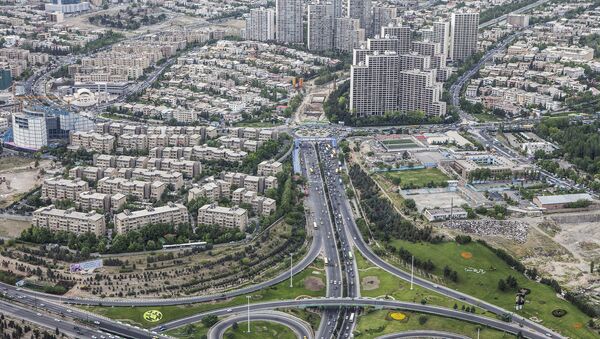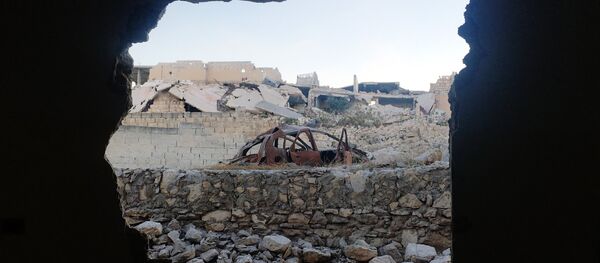MOSCOW (Sputnik) — In the interview, the diplomat talked about the current level of relations between Moscow and Tehran in a number of spheres, including defense, economy, diplomacy and struggle against terrorism.
Diplomatic Ties, State Visits
The level of relations between the two nations could be characterized by the intensity and frequency of interstate contacts. In the interview with a Sputnik correspondent, Sanaei listed a number of planned visits of Russian officials to the Asian nation.
He said that the Iranian authorities were awaiting Russian Foreign Minister Sergei Lavrov's visit to the country later in the year, however the visit of the minister was not on the official agenda yet.
"Our ministers hold regular phone consultations. They have also met in Lausanne recently, this means that there is an active exchange of views. Yes, Iran is awaiting the visit of Lavrov and it has been reported that [it will take place] this year, but it is still not in the program [of official visits]. Maybe it is caused by the fact that the [foreign] ministers [of the two countries] often meet at other venues," Sanaei said.
He added that diplomats from the two foreign ministries would meet in Tehran in December to discuss consular ties, as well as visa-free travel for the citizens of the two nations.
"In December, Tehran will host a commission on consular cooperation between the foreign ministries of the two countries," Ambassador Mehdi Sanaei said.
Russia and Iran have already simplified visa rules in place for their nationals – business people, scientists, educators and several other categories of travelers – which have been in force since February 2016.
"Now they are talking about abolishing visa requirements for tourist groups," Sanaei said, adding the two sides were going to raise this question at the December meeting. "I hope they will strike common ground."
The ambassador told Sputnik about the upcoming visit of Valentina Matvienko, the speaker of the upper house of the Russian parliament, who is expected to visit Iran on November 13-14 for talks with her Iranian counterpart.
The officials from both Iran and Russia were also expected to discuss economic cooperation at the next session of the Russian-Iranian intergovernmental commission in December.
"As for economy, the most significant event is the scheduled meeting of the [Russian-Iranian] intergovernmental commission on December 5-7 in Tehran. It is very important event, which I hope, will give a new impetus to our trade and economic relations," Sanaei said.
According to the ambassador, Russian Energy Minister Alexander Novak, who is also the commission's co-chair, is expected to attend the meeting.
Oil, Eenergy
The two nations are among the biggest oil producers in the world that is why the cooperation in the energy sphere, as well as the countries' response to falling oil prices, was also important for both Iran and Russia.
Speaking about cooperation in the sphere of oil production, the ambassador said that Russia’s energy company Rosneft could participate in oil extraction and refining projects in Iran.
"Rosneft is cooperating directly with the Petroleum Ministry and the headquarters [for Executing the Order of the Imam (Setad)]… The headquarters has various projects, and Rosneft may invest and participate in them," Sanaei said, specifying that these projects include both oil extraction and its processing.
The ambassador said that the two nations were also engaged in active and productive consultations on steps to curb oil production to stabilize global oil market.
"Consultations between Iran and Russia on this issue are ongoing, they are productive. The [Iranian and Russian] ministers… met in Algeria, they are in constant contact. I think that the cooperation between Iran and Russia in this respect is very important," Sanaei said, commenting an agreement of the Organization of the Petroleum Exporting Countries (OPEC) member states on oil output freeze, which was reached on September 25 in Algeria.
According to the diplomat, the two countries are also expected to hold the first stone-laying ceremony of the Bandar Abbas power plant in Iran's Hormozgan province soon.
"The ceremony of the first stone laying of four units of the Bandar Abbas power plant, which will be constructed by the Russian company Technopromexport together with the Iranian partners, will take place soon. The units' capacity is 350 and 400 MW with the total output of 1,400 MW," Sanaei said.
Defense Ties
Moscow and Tehran have been long-time partners in the field of military and technical cooperation. For example, Russia has recently concluded the contract on supplying Iran with divisions of S-300 missile systems to Iran.
Speaking about the relations between the two sides in the sphere, the diplomat said that Tehran was looking to expand the existing level of relations.
"Iran is interested in continuing cooperation in defense area with Russia and even in expanding and developing it. I hope that even in those sectors that require coordination with the UN Security Council and need a resolution. I hope that the process of discussing the possibility of obtaining such a permit will begin," Sanaei said,
The diplomat also expressed hope that the bilateral defense cooperation would reach the levels that would allow the two countries to agree on significant volumes of arms purchases.
At the same time the ambassador added that the issue of the delivery of Russia's S-400 air defense systems to Iran was not under discussion.
Syria, Struggle With Terrorism
"Generally, Iran and Russia closely cooperate on the issue of Syria. Now there are no significant problems," Sanaei said, answering a question about the cooperation between the two nations on Syria and the issue of use of the Hamadan air base by the Russian Aerospace Forces.
The diplomat added that the positions of the two nations were similar in regard to the threat posed by terrorism, adding that the Western countries should fight against terrorism not in word, but in deed.
"Terrorism is the primary threat and the most important problem for Iran and Russia both in theory and in practice. That's why we consider that all the forces should be combined to tackle this issue and only after that [the countries could] be engaged in other problems. And there are the Western states that say in theory that terrorism is a problem, but in practice they sometimes have other priorities and plans. That's why the problem cannot be solved yet," Sanaei said.
The ambassador said that Western countries should also change their position on the Syrian crisis in order to reach the settlement of the ongoing conflict.
"It is very important that the West's position and approach to the Middle Eastern issue change. I think that if there is any common solution [to the Syrian crisis], it could be achieved only after the correction of the position by West," the Sanaei said.
On October 17, Iraqi Prime Minister Haider Abadi announced the start of a military operation to recapture Mosul from Daesh with the help of airstrikes by the US-led international coalition. Ambassador Sanaei said the Iranian government stood by Iraq and believed a strong government in Baghdad benefited the entire region.
He added that efforts aimed at joining forces to liberate Mosul occupied by the Daesh group, outlawed in many countries, including Russia, would be a positive step only if the move was made within the framework of the struggle against terrorism.
"This will be a positive development only as part of the effort to fight terrorism, rather than a tool in a geopolitical struggle or part of a plan, for instance in the US election race," the Iranian diplomat said, commenting on a recent US presidential candidate Donald Trump's claim that Iran would be the "big winner" in Mosul.




